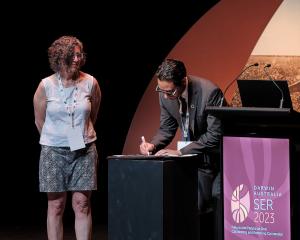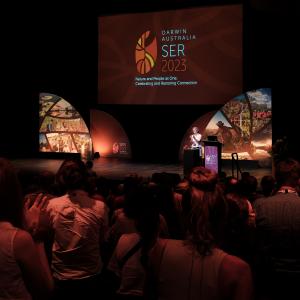DARWIN, NT, AUSTRALIA, October 2, 2023 /EINPresswire.com/ -- The Society for Ecological Restoration (SER), in collaboration with the UN Decade on Ecosystem Restoration Advisory Board and more than 1,000 delegates at SER2023, issued a Call to Action at the closing ceremony of the 10th World Conference on Ecological Restoration.
The need for ecological restoration has never been more evident or imperative, as evidenced by recent catastrophic droughts, floods, and fires. The Call to Action emphasizes the urgent need to scale up effective, standards-based restoration worldwide as a mechanism to re-establish a healthy, balanced connection between people and nature, by:
— Recognizing and securing the rights of Indigenous Peoples, local communities, and underrepresented people to their land, territories, knowledge, and resources, and elevating their leadership and roles as agents of change at all stages of restoration.
— Inspiring all of society to embrace ecological restoration as a priority for reducing risk and rebuilding in the wake of climate disasters, strengthening community resilience, restoring health and wellbeing, and recovering vital ecosystems services.
— Encouraging governments to realign policies and funding to proactively support inclusive, participatory ecological restoration.
— Urging the global business community to give back more than they take across their entire value chains, not just by reducing negative impacts, but by investing in the restoration of degraded ecosystems to support long-term business sustainability.
“The time for a true commitment to scaling up restoration and delivering on its promise is now,” said Bethanie Walder, Executive Director of the Society for Ecological Restoration. “The momentum and energy from the SER2023 delegates inspire us to unite and act, sharing our knowledge, building capacity and frameworks, and driving investment to deliver on the ambitious targets of the UN Decade.”
“Indigenous communities manage or have tenure rights to an estimated 85% of global areas proposed for biodiversity protection,” said Marina Best on the final day of SER2023, speaking on behalf of her Métis community. Ms. Best, who is also the Indigenous Relations Manager for the National Urban Parks and Ecological Corridors programs at Parks Canada, offered an effective blueprint for large-scale Indigenous-led restoration projects. “Creating more opportunities for Indigenous peoples and local communities to lead restoration and conservation projects on their traditional lands is essential for success. In practice, this means ensuring projects are locally relevant, grounded in clear language that is aligned with local cultures, based on strong relationships and networks, and offer access to resources such as training.”
“To effectively scale up ecological restoration it must be supported by clear goals, given the likely trade-offs between desired environmental outcomes and impacts on production and livelihoods,” said Fangyuan Huan, a Conservation Ecologist at Peking University, China. “This is why we must take a holistic view, on a spatial scale that accounts for impacts on neighboring landscapes and countries, and rely on broad collaboration. In China, we have seen a vital shift in the last decade as the Government increasingly recognizes the importance within its policies of leading with natural regeneration. This has come as a result of years of education from the scientific community.”
“We have a vision for scaling up ecosystem restoration to bring about transformational change,” said Gopal Patel, Co-Chair of the Advisory Board for the UN Decade on Ecosystem Restoration. “But it can only be done if we work together. This means all of society: governments, scientists, business, faith groups, Indigenous peoples and local communities, sharing knowledge and ideas, driving policy-change and channeling investment into projects large and small. This decade is crucial, but the work does not stop there. Quite simply, restoration is an investment in the future of our planet and in future generations that we can’t afford to not make.”
###
About the Society for Ecological Restoration
The Society for Ecological Restoration (SER) advances the science, practice, and policy of ecological restoration to sustain biodiversity, improve resilience in a changing climate, and re-establish an ecologically healthy relationship between nature and culture. An international non-profit organization with over 5,000 members in more than 110 countries, we actively promote participatory, knowledge-based approaches to restoration. Learn more about our work at www.ser.org.
About the UN Decade on Ecosystem Restoration
The UN Decade on Ecosystem Restoration 2021-2030, led by the United Nations Environment Programme, the Food and Agriculture Organization of the United Nations and its partners, covers terrestrial as well as coastal and marine ecosystems. As a global call to action, it will draw together political support, scientific research and financial muscle to massively scale up restoration. Find out how you can contribute to the UN Decade. Follow #GenerationRestoration.
For more information please contact:
Media Contact - Society for Ecological Restoration
Florencia Panizza
florencia@claro-comm.com
Media Contact - UN Decade on Ecosystem Restoration
Moses Osani
Public Information Officer,
UN Environment Programme (UNEP)
moses.osani@un.org
SER2023 Conference Contact:
Bethanie Walder
Society for Ecological Restoration
bethanie@ser.org
Florencia Panizza
Claro Communications Consulting
florencia@claro-comm.com
Visit us on social media:
Facebook
Twitter
LinkedIn
Instagram
Other




